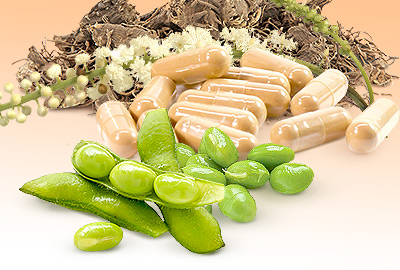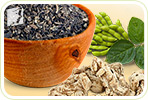Vaginal dryness is a common and irritating symptom of menopause, affecting over 50% of American women between the ages of 45 and 55. There is a range of methods available for combating vaginal dryness caused by menopause.
What Is Vaginal Dryness?

The vagina is lubricated by glands in the cervix that keep the vagina supple and moist. The moisture lubricates the vagina, keeping it clean and removing dead cells. This vaginal moisture is slightly acidic, which helps to prevent infections such as thrush (Candida albicans). During sex, glands at the entrance of the vagina (Bartholin's glands) produce extra moisture to facilitate sexual intercourse.
Quick Fact
However, after menopause, estrogen levels start to decrease, leading to reduced lubrication during sexual activity. This is because with less production of estrogen, the vaginal walls and vulva become thinner, drier, and less elastic.
What Are the Symptoms of Vaginal Dryness?
Vaginal dryness, also known as vaginal atrophy, causes the vaginal walls to become thinner, weaker, and drier. Vaginal dryness can lead to general discomfort, itching, and pain during sex. Other vaginal dryness symptoms in women may include:
- Bleeding after sex
- Change in the overall look of the vagina
- Change in vaginal discharge, which may become more discolored and watery
What Can I Do about the Symptoms of Vaginal Dryness?
Women should not have to live with vaginal dryness or lower quality sex. There are effective treatments available for vaginal dryness, but it is also important to be careful because not all treatments are effective, and some can even be harmful.

Local estrogen treatment is available in the form of small tablets inserted into the vagina with an applicator, as well as vaginal rings and creams. These are available by prescription and are usually seen as the most effective way to treat vaginal dryness.
Vaginal moisturizer is applied to the vagina on a regular basis. Moisturizer is absorbed into the vagina, which can help reduce vaginal dryness over time. It can also be purchased over-the-counter at a local pharmacy.
Vaginal lubricants, are applied before or during sex. Unlike moisturizers, lubricants are not absorbed into the body; they just are meant to reduce friction during sex. Water-based lubricant is usually recommended, since other types of lubricant can increase a person's risk of getting an infection and cause a condom to break.
Click on the following link to learn more about treatments for vaginal dryness.
Sources
- Bachmann, G.A. & Nevadunsky, N.S. (2000). Diagnosis and Treatment of Atrophic Vaginitis. American Family Physician, 61, 3090-3096. http://www.aafp.org/afp/2000/0515/p3090.html
- Mayo Clinic Staff. (2013). Vaginal Atrophy. Retrieved November 11, 2015, from http://www.mayoclinic.org/diseases-conditions/vaginal-atrophy/basics/definition/con-20025768


